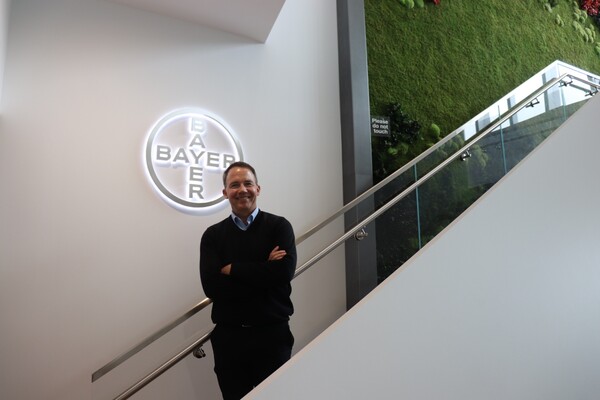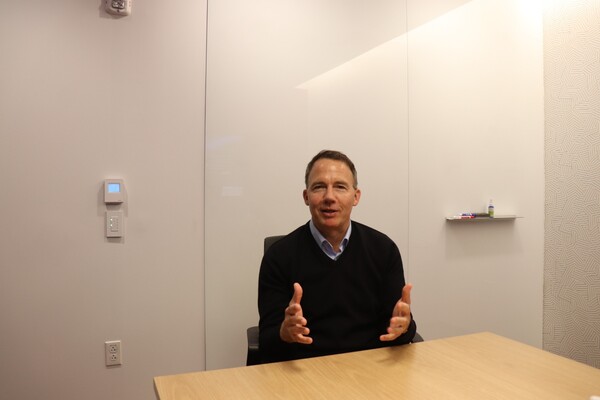BOSTON, Mass. -- By Lee Han-soo/Korea Biomedical Review correspondent -- Recent breakthroughs in cell and gene therapy (CGT) have reignited optimism in the treatment of previously untreatable diseases. Leading the charge is Bayer Pharmaceuticals, utilizing pioneering strategies and strategic acquisitions to drive progress and propel medical innovation to unprecedented levels.

In an exclusive interview with Korea Biomedical Review in Boston, Mass., on June 7, Jost Reinhard, Bayer Pharmaceuticals' Head of the Cell and Gene Therapy Unit, shed light on Bayer's approach to identifying and prioritizing potential targets for development, the significance of recent acquisitions, collaborative opportunities, efforts to enhance accessibility and affordability, manufacturing challenges, and the future of CGT.
Reinhard said his primary responsibility is to establish Bayer's CGT strategy.
He highlighted the team's crucial role in overseeing the comprehensive strategy, providing support to platform companies, managing the portfolio, and ensuring transparency and diligent oversight at every step of the process.
When discussing how Bayer prioritizes potential targets and approaches for development, Reinhard said the company selects technologies based on their maturity degree, accessibility, and ability to make a meaningful difference in patient treatment.
"Bayer adopted a two-pronged strategy, combining a platform approach to master specific technologies with acquisitions, collaborations, and in-house capacities," Reinhard said. "This strategy led to Bayer's acquisition of BlueRock Therapeutics and AskBio, two companies renowned for their expertise and capabilities in the CGT field."

Strategic acquisitions strengthen Bayer's CGT portfolio
Reinhard stressed the pivotal importance of these acquisitions to Bayer's CGT portfolio, emphasizing that they serve as the cornerstone of their strategy.
BlueRock Therapeutics, specializing in regenerative medicines, boasts a clinical development program for Parkinson's disease and is recognized as a leader in stem cell-based therapies, with a focus on pluripotent stem cells.
AskBio, on the other hand, focuses on gene therapy, particularly adeno-associated virus (AAV) gene therapies, and has substantial expertise in AAV-related patents and vector design.
Collaborative opportunities between Bayer and the acquired companies were a key point as the company is currently focusing on mastering the technology and leveraging the assets within the portfolios of BlueRock and AskBio.
"These portfolios encompass various programs in areas of high unmet need where limited or no treatment options are currently available, including Parkinson's disease, ocular diseases, cardiovascular disease, heart failure, Pompe disease, Huntington's disease, limb-girdle muscular dystrophy, and multiple system atrophy," he said.
In terms of assessing the potential market value, commercial viability, and accessibility of CGT products, Bayer followed a comprehensive evaluation process, Reinhard noted.
"We consider parameters such as epidemiology, unmet medical need, technical feasibility, compelling science, and Bayer's competencies and resources," he said.
Reinhard also acknowledged that pricing was contingent upon the value created for patients, the healthcare system and society and emphasized the need for collaboration with regulators and reimbursement agencies to ensure accessibility.
Addressing concerns about the cost-effectiveness, scalability, and manufacturing challenges of CGT products, Reinhard expressed confidence in Bayer's ability to scale these therapies by investing in the know-how and infrastructure to make CGTs a reality for patients around the world.
He differentiated between autologous and allogeneic cell therapy approaches, explaining that autologous therapies are complex to produce and scale since they come from the patients themselves, while allogeneic therapies offer the potential for off-the-shelf products that are not limited by capacity.
"The allogeneic approach, which is what BlueRock is doing, relies on pluripotent stems derived from healthy donor cells which are then differentiated into the cell therapy (e.g., dopaminergic cells)," he said. "This allows them to be multiplied into dosing for multiple patients and ultimately removes the capacity limitation."
According to Reinhard, the same holds true for gene therapies.
"Of course, these are incredibly complicated to produce, and I would say it's a mastery and an art in producing these gene therapies," he said. "But in principle, it's a question of capacity building, and of giving this the right formats and technology in order to get this scale."
Bayer is confident that it can scale these products for larger populations.
Boston, an important R&D site for Bayer's CGT efforts
Reinhard discussed Bayer's presence in Boston and the benefits it brings.
The company aims to tap into the talent base and network within the thriving biotech ecosystem.
Bayer engages in partnerships, networking, and potential venture investments to explore new technologies and nurture relationships with emerging entities, he said.
Reinhard highlighted Co.Lab Cambridge, an incubator located at Bayer's Cambridge office specifically designed to support cutting-edge CGT entrepreneurs with access to Bayer's enterprise-wide expertise in addition to state-of-the-art laboratory and office space, as a perfect example.
"Co.Lab is a fantastic opportunity for us to get a first contact with newly established entities with small groups or young companies and to accompany them for a period of 12 to 24 months during their maturation period and help them move forward," he said. "The ultimate idea for us is that ideally, once they graduate, we would also consider partnering with them."
When asked about the potential of CGT to revolutionize patient care and transform the treatment landscape, Reinhard expressed a firm belief in their significant impact. He emphasized that cell therapies and gene therapies would become an integral part of future therapeutic approaches, offering novel solutions for currently untreatable diseases.
Looking ahead, Reinhard outlined Bayer's key goals and aspirations in CGT.
"The company is committed to transforming medicine and making a meaningful difference in patients' lives," he said. "Our mission, 'science for a better life,' really drives this company forward, and I am eager to see the scientific advancements that can be applied to address unmet medical needs and envision a future where cell and gene therapy plays a central role in healthcare innovation."
Related articles
- [KBR Exclusive: Inside Boston Biocluster] Bayer pioneers precision molecular oncology for cancer breakthroughs
- [KBR Exclusive: Inside Boston Biocluster] Pfizer’s early clinical focus: boosting success, slashing costs
- [KBR Exclusive: Inside Boston Biocluster] Transforming R&D strategy and embracing innovation: Takeda R&D chief
- [KBR Exclusive: Inside Boston Biocluster] Moderna's rise to prominence in the Covid-19 era and beyond
- [KBR Exclusive: Inside Boston Biocluster] Korean scientist at Moderna pioneers process chemistry
- Bayer North Asia to take helm in advancing radiology innovation

